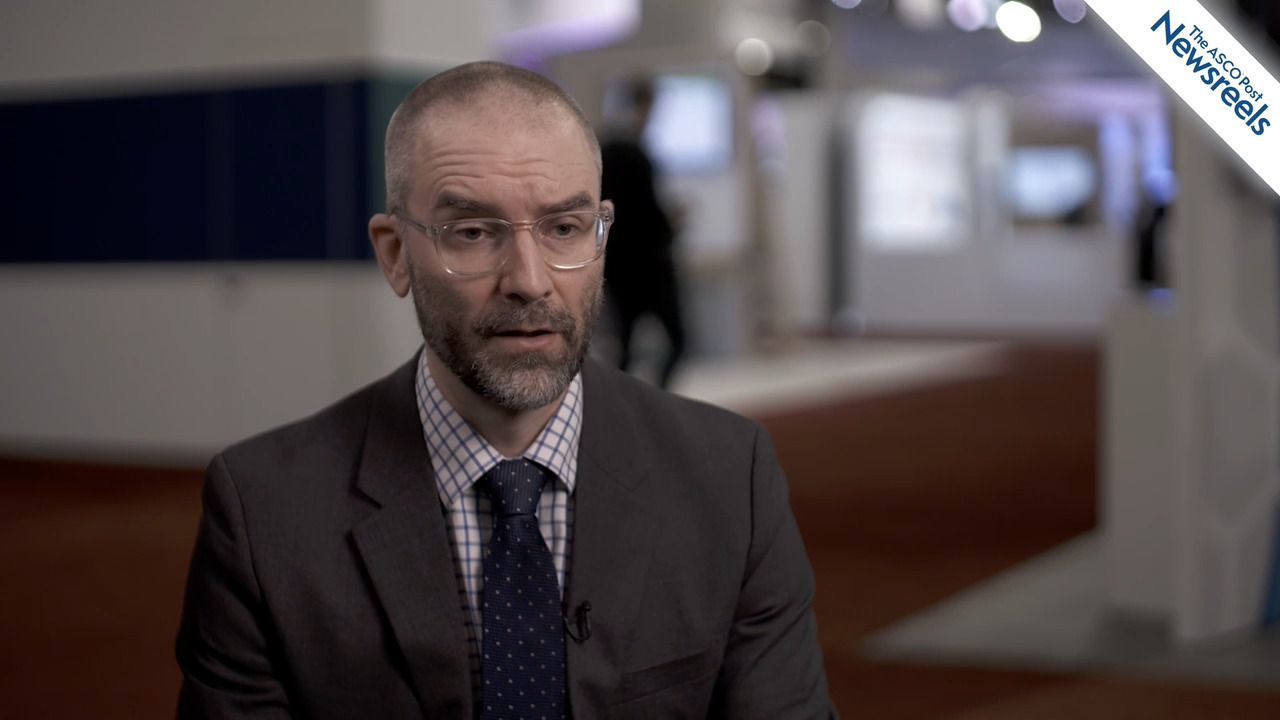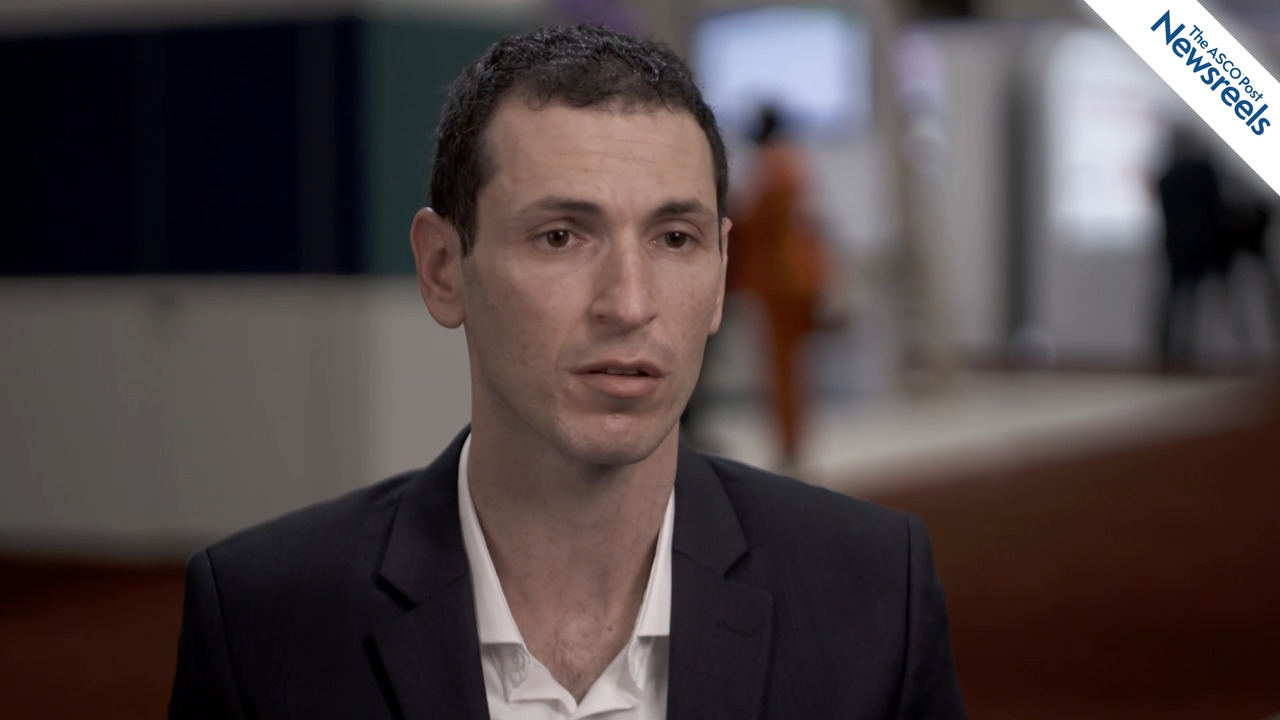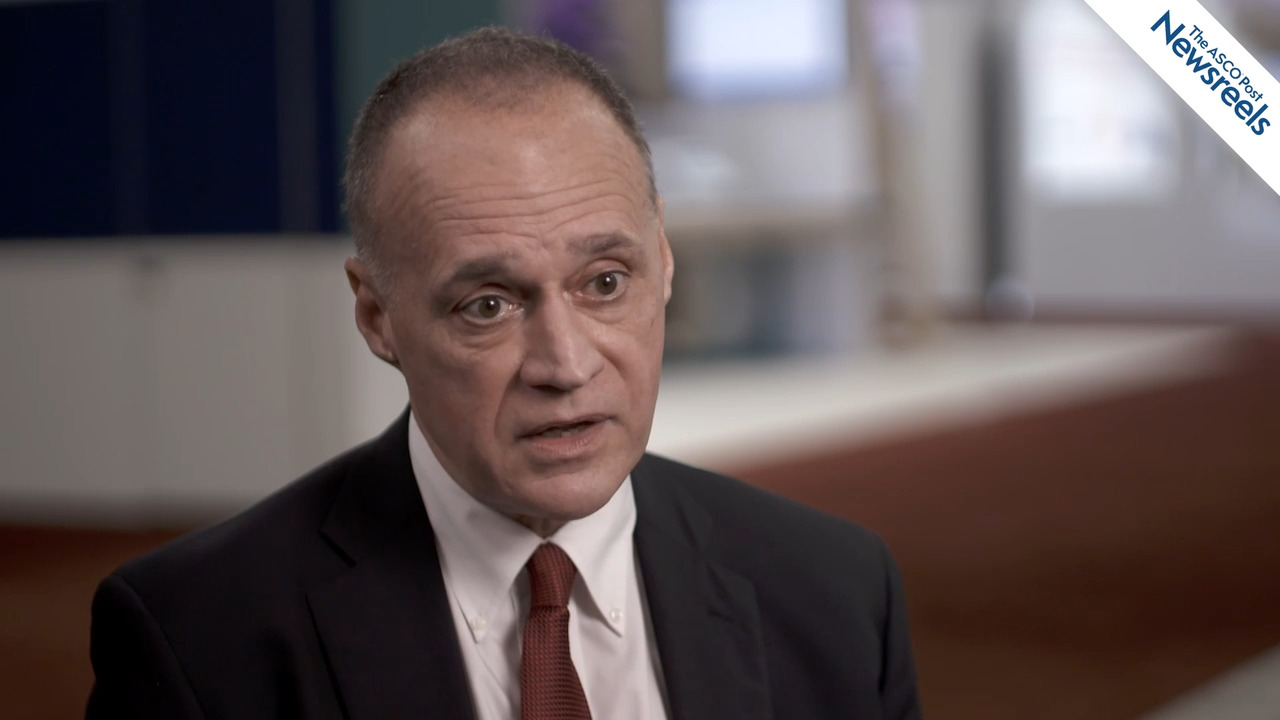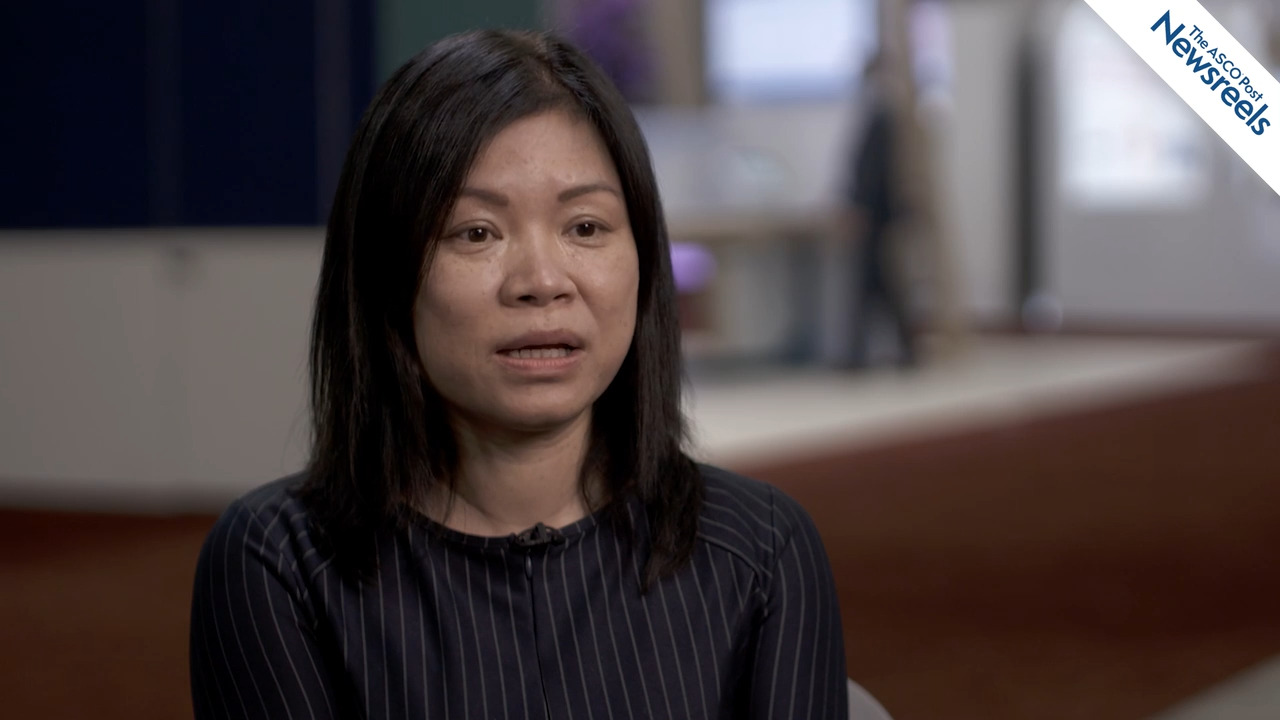Mihir Gupta, MD, and Ganesh M. Shankar, MD, PhD, Offer Commentary on the Use of ctDNA to Detect CNS Lymphoma
Mihir Gupta, MD, a neurosurgery resident at the University of California San Diego and postdoctoral fellow at Massachusetts General Hospital Department of Neurosurgery, and Ganesh M. Shankar, MD, PhD, Assistant Professor of Neurosurgery, Massachusetts General Hospital and Harvard Medical School,...
Noninvasive Diagnosis of CNS Lymphoma Possible Through ctDNA
Circulating tumor DNA (ctDNA) is readily detectable in the plasma and cerebrospinal fluid of patients with central nervous system (CNS) lymphoma and is a strong prognostic biomarker for outcomes, a team of researchers from Germany and Stanford University reported at the 2021 American Society of...
CAR T-Cell Therapy as Second-Line Treatment in Large B-Cell Lymphomas
“The mind is not a vessel to be filled but a fire to be kindled.” —Plutarch About 30% to 40% of patients with newly diagnosed diffuse large B-cell lymphoma (DLBCL) experience relapse, and 10% are refractory to the...
Axicabtagene Ciloleucel vs Standard of Care as Second-Line Treatment for Large B-cell Lymphoma
As reported in The New England Journal of Medicine by Frederick L. Locke, MD, and colleagues, the phase III ZUMA-7 trial of patients with large B-cell lymphoma has shown improved event-free survival with second-line axicabtagene ciloleucel vs chemoimmunotherapy with high-dose chemotherapy and...
Mosunetuzumab Meets Primary Endpoint of Phase II Trial in Relapsed or Refractory Follicular Lymphoma
The bispecific antibody mosunetuzumab achieved deep and durable remissions as monotherapy in patients with relapsed or refractory follicular lymphoma, according to the results of a pivotal phase II trial presented at the 2021 American Society of Hematology (ASH) Annual Meeting & Exposition.1 In ...
Expert Point of View: Laurie H. Sehn, MD, MPH, and Alex Herrera, MD
Laurie H. Sehn, MD, MPH, Clinical Professor with the BC Cancer Centre for Lymphoid Cancer and University of British Columbia, Vancouver, Canada, and Alex Herrera, MD, Associate Professor in Hematology and Hematopoietic Cell Transplantation at the Beckman Research Institute of City of Hope, Duarte,...
ZUMA-7: Axicabtagene Ciloleucel Quadruples Event-Free Survival in Large B-Cell Lymphoma
In the primary analysis of the phase III ZUMA-7 trial, examining second-line therapy for relapsed or refractory large B-cell lymphoma, the CAR T-cell therapy axicabtagene ciloleucel led to a fourfold increase in event-free survival over the standard of care. These findings were presented at the...
Expert Point of View: Laurie H. Sehn, MD, MPH
The moderator of the session, Laurie H. Sehn, MD, MPH, Clinical Professor at the BC Cancer Centre for Lymphoid Cancer and University of British Columbia, Vancouver, Canada, called the results of the TRANSFORM trial “quite remarkable” and said chimeric antigen receptor (CAR) T-cell therapy has the...
TRANSFORM: Lisocabtagene Maraleucel Improves Outcomes in Relapsed or Refractory Large B-Cell Lymphoma
Chimeric antigen receptor (CAR) T-cell therapy with lisocabtagene maraleucel could prove to be the new standard-of-care treatment for patients with relapsed or refractory large B-cell lymphoma in the second-line setting, according to data presented at the 2021 American Society of Hematology (ASH)...
Expert Point of View: Jane N. Winter, MD, and Christopher R. Flowers, MD, MS
Jane N. Winter, MD, Professor of Medicine at Northwestern University’s Feinberg School of Medicine and 2022 President of the American Society of Hematology (ASH), and Christopher R. Flowers, MD, MS, Chair of the Department of Lymphoma/Myeloma at The University of Texas MD Anderson Cancer Center,...
POLARIX: Addition of Polatuzumab Vedotin-piiq to Standard of Care Significantly Reduces Progression of Diffuse Large B-Cell Lymphoma
As a first-line treatment of intermediate- or high-risk diffuse large B-cell lymphoma, the addition of the antibody-drug conjugate polatuzumab vedotin-piiq to standard-of-care therapy resulted in a 27% reduction in the relative risk of disease progression, relapse, or death, with a similar safety...
(My) German Hodgkin Story
Nearly 200 years ago, Thomas Hodgkin for the first time described a peculiar disease with undulating fever, enlarged lymph nodes, and a big spleen. Its nature was obscure. It was a fatal illness, affecting mainly young adults and children. In 1865, Samuel Wilks named this illness Hodgkin’s...
BELINDA: CAR T-Cell Therapy Fails to Improve Outcomes in Aggressive Non-Hodgkin Lymphoma
The autologous chimeric antigen receptor (CAR) T-cell therapy tisagenlecleucel failed to improve event-free survival vs standard-of-care treatment strategies in patients with aggressive, relapsed or refractory non-Hodgkin lymphoma (NHL), according to the results of the phase III BELINDA trial,...
Ibrutinib/Rituximab Induction Followed by R-HCVAD in Front-Line Treatment of Patients Aged 65 and Younger With Mantle Cell Lymphoma
In the single-institution phase II WINDOW-1 trial reported in The Lancet Oncology, Michael L. Wang, MD, and colleagues found that 12 cycles of induction ibrutinib/rituximab produced objective response in nearly all patients aged ≤ 65 years with mantle cell lymphoma, allowing a reduction in cycles...
FDA Investigating Possible Increased Risk of Death With Lymphoma Treatment Umbralisib
The U.S. Food and Drug Administration (FDA) is investigating a possible increased risk of death associated with umbralisib (Ukoniq), a kinase inhibitor including PI3K-delta and CK1-epsilon, approved to treat marginal zone and follicular lymphomas. The FDA determined that initial findings from the...
Ibrutinib/Rituximab for Indolent Clinical Types of Mantle Cell Lymphoma
In a Spanish phase II trial (IMLC-2015) reported in the Journal of Clinical Oncology, Giné et al found that the combination of ibrutinib and rituximab produced a high complete response rate in previously untreated patients with indolent clinical types of mantle cell lymphoma. Study Details In the...
Long-Term Morbidity in Patients With Stage I to IIA Classical Hodgkin Lymphoma Treated With ABVD and Limited-Field Radiotherapy
In a Swedish study reported in the Journal of Clinical Oncology, Lagerlöf et al identified rates of long-term morbidity in a more contemporary cohort of patients with stage I to IIA classical Hodgkin lymphoma treated with ABVD (doxorubicin, bleomycin, vinblastine, and dacarbazine) and the more...
FDA Approves New Label Update for CAR T-Cell Therapy Axicabtagene Ciloleucel
On January 31, the FDA approved an update to the prescribing information for axicabtagene ciloleucel (Yescarta) to include use of prophylactic corticosteroids across all approved indications. Axicabtagene ciloleucel is now the first and only chimeric antigen receptor (CAR) T-cell therapy with...
PET-Based De-escalation Strategy for Previously Untreated Advanced Hodgkin Lymphoma
As reported in the Journal of Clinical Oncology by Casasnovas et al, final results of the phase III AHL2011 Lymphoma Association Study showed continued similarity of progression-free and overall survival over long-term follow-up with positron-emission tomography (PET)-based de-escalation of...
Rituximab Plus Chemotherapy for Pediatric Mature B-Cell Non-Hodgkin Lymphoma and Mature B-Cell Acute Leukemia
On December 2, 2021, rituximab was approved for use in combination with chemotherapy for pediatric patients (≥ 6 months to 18 years) with previously untreated, advanced-stage, CD20-positive diffuse large B-cell lymphoma, Burkitt lymphoma, Burkitt-like lymphoma, or mature B-cell acute leukemia.1...
BELINDA Trial: CAR T-Cell Therapy Fails to Improve Outcomes in Aggressive Non-Hodgkin Lymphoma
The autologous chimeric antigen receptor (CAR) T-cell therapy tisagenlecleucel failed to improve event-free survival vs standard-of-care treatment strategies in patients with aggressive, relapsed or refractory non-Hodgkin lymphoma (NHL), according to results of the phase III BELINDA trial,...
Mosunetuzumab Meets Primary Endpoint of Phase II Trial in Relapsed or Refractory Follicular Lymphoma
The bispecific antibody mosunetuzumab achieved deep and durable remissions as monotherapy in patients with relapsed or refractory follicular lymphoma, according to the results of a pivotal phase II trial presented at the 2021 American Society of Hematology (ASH) Annual Meeting & Exposition.1 In ...
POLARIX: Addition of Polatuzumab Vedotin-piiq to Standard of Care Significantly Reduces Progression of Diffuse Large B-Cell Lymphoma
As a first-line treatment of inter-mediate- or high-risk diffuse large B-cell lymphoma, the addition of the antibody-drug conjugate polatuzumab vedotin-piiq to standard-of-care therapy resulted in a 27% reduction in the relative risk of disease progression, relapse, or death, with a similar safety...
Lisocabtagene Maraleucel Improves Outcomes in Relapsed or Refractory Large B-Cell Lymphoma
Chimeric antigen receptor (CAR) T-cell therapy with lisocabtagene maraleucel could prove to be the new standard-of-care treatment for patients with relapsed or refractory large B-cell lymphoma in the second-line setting, according to data presented at the 2021 American Society of Hematology (ASH)...
ZUMA-7: Axicabtagene Ciloleucel Quadruples Event-Free Survival in Large B-Cell Lymphoma
In the primary analysis of the phase III ZUMA-7 trial, examining second-line therapy for relapsed or refractory large B-cell lymphoma, the CAR T-cell therapy axicabtagene ciloleucel led to a fourfold increase in event-free survival over the standard of care. These findings were presented at the...
Tycel Phillips, MD, on Marginal Zone Lymphoma: Efficacy and Safety of Parsaclisib
Tycel Phillips, MD, of the Rogel Cancer Center, University of Michigan, discusses phase II findings from the CITADEL-204 study of parsaclisib, a next-generation inhibitor of phosphatidylinositol 3-kinase. The agent, used as a monotherapy, appeared to benefit patients with relapsed or refractory marginal zone lymphoma who had a rapid and durable clinical response (Abstract 44).
Manali Kamdar, MD, on Large B-Cell Lymphoma: Lisocabtagene Maraleucel vs the Standard of Care
Manali Kamdar, MD, of the University of Colorado Cancer Center, discusses phase III results from the TRANSFORM study, which suggest that lisocabtagene maraleucel, a CD19-directed CAR T-cell therapy, improved outcomes with a favorable safety profile and may be a potential new standard of care for second-line treatment of patients with relapsed or refractory large B-cell lymphoma (Abstract 91).
Response-Adapted Omission of Radiotherapy and Comparison of Consolidation Therapy in Pediatric Classical Hodgkin Lymphoma
In analyses from the European EuroNet-PHL-C1 study reported in The Lancet Oncology, Mauz-Körholz et al found that radiotherapy could be omitted in pediatric patients with intermediate- or advanced-stage classical Hodgkin lymphoma who had adequate response to induction with OEPA (vincristine,...
Bispecific Antibody Mosunetuzumab in Relapsed or Refractory B-Cell Lymphomas
In a phase I study reported in the Journal of Clinical Oncology, L. Elizabeth Budde, MD, PhD, and colleagues found that the CD20-CD3 bispecific antibody mosunetuzumab produced durable responses in patients with relapsed or refractory aggressive and indolent B-cell non-Hodgkin lymphomas....
Joe Schroers-Martin, MD, on Follicular Lymphoma: Precursor Mutations May Be Detectable Years Before Diagnosis
Joe Schroers-Martin, MD, of Stanford University, discusses his latest study findings, which show that follicular lymphoma driver mutations are detectable in blood and saliva years prior to a clinical diagnosis. These data build on previous work and suggest that researchers may be able to stratify people at elevated risk of clinical malignancy (Abstract 709).
Polatuzumab Vedotin-piiq Plus R-CHP vs R-CHOP for Previously Untreated Patients With DLBCL
In the phase III POLARIX trial reported in The New England Journal of Medicine, Tilly et al found that polatuzumab vedotin-piiq plus R-CHP (rituximab, cyclophosphamide, doxorubicin, and prednisone) significantly improved progression-free survival vs R-CHOP (rituximab, cyclophosphamide, doxorubicin, ...
Second-Line Tisagenlecleucel vs Standard of Care in Aggressive B-Cell Lymphoma
As reported in The New England Journal of Medicine by Bishop et al, the phase III BELINDA trial showed no improvement in event-free survival with second-line tisagenlecleucel vs standard of care including salvage chemotherapy and autologous hematopoietic stem cell transplantation (HSCT) in patients ...
Effect of TP53 Alterations on Outcomes of CD19-Targeted CAR T-Cell Therapy for Patients With Large B-Cell Lymphoma
In a single-center retrospective study reported in the Journal of Clinical Oncology, Shouval et al found that the presence of TP53 alterations was associated with poorer outcomes in patients treated with CD19-targeted chimeric antigen receptor (CAR) T-cell therapy (CD19–CAR-T) for relapsed or...
Roni Shouval, MD, PhD, on TP53-Mutant Large B-Cell Lymphoma and CAR T-Cell Therapy
Roni Shouval, MD, PhD, of Memorial Sloan Kettering Cancer Center, discusses his findings, which show, for the first time, that TP53 alterations are a valuable prognostic and potentially predictive marker in patients with large B-cell lymphoma who receive CD19–CAR T-cell therapy. Gene-expression profiling suggests that TP53 alterations result in an immunosuppressive tumor microenvironment and impaired apoptosis signaling, which could lead to decreased CAR T-cell therapy efficacy (Abstract 710).
Michael R. Bishop, MD, on Aggressive B-Cell NHL: Tisagenlecleucel vs Standard of Care as Second-Line Therapy
Michael R. Bishop, MD, of the University of Chicago, discusses insights from findings of the phase III BELINDA study, which may inform the design of future CAR T-cell trials, as well as the use of second-line tisagenlecleucel therapy in patients with relapsed or refractory aggressive B-cell non-Hodgkin lymphoma (Abstract LBA-6).
ZUMA-5 Trial: Axicabtagene Ciloleucel in Relapsed or Refractory Indolent Non-Hodgkin Lymphoma
As reported in The Lancet Oncology by Caron A. Jacobson, MD, and colleagues, the phase II ZUMA-5 trial showed that axicabtagene ciloleucel, an autologous anti-CD19 chimeric antigen receptor (CAR) T-cell therapy, produced high rates of durable responses in patients with relapsed or refractory...
POLARIX: Pola-R-CHP vs R-CHOP for Previously Untreated Patients With DLBCL
The POLARIX study found patients with diffuse large B-cell lymphoma (DLBCL) had a significantly higher likelihood of survival without disease progression 2 years after receiving a new drug combination known as pola-R-CHP (polatuzumab vedotin-piiq with rituximab, cyclophosphamide, doxorubicin, and...
BELINDA Study: Second-Line Tisagenlecleucel Equivalent to Standard of Care for Relapsed or Refractory Aggressive B-Cell Non-Hodgkin Lymphoma
In an analysis of the phase III BELINDA trial presented by Bishop et al during the 2021 American Society of Hematology (ASH) Annual Meeting & Exposition (Abstract LBA-6), the chimeric antigen receptor (CAR) T-cell therapy tisagenlecleucel was not found to improve event-free survival over the...
ZUMA-7 Primary Analysis: Second-Line Axicabtagene Ciloleucel Quadruples Event-Free Survival in Large B-Cell Lymphoma
In the primary analysis of the phase III ZUMA-7 trial, the chimeric antigen receptor (CAR) T-cell therapy axicabtagene ciloleucel led to a fourfold increase in event-free survival over the standard of care in the second-line treatment of relapsed or refractory large B-cell lymphoma, according to...
Addition of Romidepsin to CHOP in Previously Untreated Patients With Peripheral T-Cell Lymphoma
As reported in the Journal of Clinical Oncology by Bachy et al, the Lymphoma Study Association phase III Ro-CHOP trial showed no progression-free survival benefit with the addition of the histone deacetylase inhibitor romidepsin to CHOP (cyclophosphamide, doxorubicin, vincristine, and prednisone)...
Daniel A. Ermann, MD, on DLBCL: Outcomes With Consolidative Radiation Therapy
Daniel A. Ermann, MD, of the Huntsman Cancer Institute, University of Utah, discusses results from the largest retrospective study on outcomes utilizing radiotherapy in early-stage diffuse large B-cell lymphoma. Adding radiation to front-line multiagent chemotherapy was associated with a survival benefit for all patients with early-stage disease. An overall survival benefit was seen with the addition of radiation to front-line multiagent chemotherapy for patients with nodal involvement and those with specific extranodal involvement in the testes, thyroid, skin and soft tissue, and head and neck (Abstract 49).
L. Elizabeth Budde, MD, PhD, on Relapsed/Refractory Follicular Lymphoma: Early Results on Mosunetuzumab Monotherapy
L. Elizabeth Budde, MD, PhD, of City of Hope, discusses phase I/II findings that showed mosunetuzumab monotherapy induces deep and durable remissions in patients with relapsed or refractory follicular lymphoma who have received two or more prior lines of treatment, including those with double-refractory disease. Because follicular lymphoma is associated with frequent relapses and decreasing progression-free intervals with successive lines of conventional therapy, these data are encouraging (Abstract 127).
TRANSFORM Trial: Lisocabtagene Maraleucel vs Standard of Care for Relapsed or Refractory Large B-Cell Lymphoma
An interim analysis of the TRANSFORM trial comparing the chimeric antigen receptor (CAR) T-cell immunotherapy lisocabtagene maraleucel to standard of care found that the CAR T-cell therapy significantly improved event-free survival for patients with large B-cell lymphoma that persisted or returned...
Activity of Mosunetuzumab in Pretreated Patients With Relapsed or Refractory Follicular Lymphoma
The bispecific antibody mosunetuzumab achieved deep and durable remissions as monotherapy in patients with relapsed or refractory follicular lymphoma who had received two or more prior lines of therapy, according to pivotal results of a phase I/II trial presented at the 2021 American Society of...
Potential Impact of Nurse Navigation Program in Achieving Equitable Care and Outcomes in Patients With Aggressive Large B-Cell Lymphoma
In a single-institution study reported in the journal Cancer, and reviewed in the September 10, 2021, issue of The ASCO Post, Bei Hu, MD, and colleagues from Levine Cancer Institute/Atrium Health found that the use of a dedicated nurse navigation program aided in producing similar patterns of...
FDA Approves Rituximab Plus Chemotherapy for Several Pediatric Hematologic Malignancies
On December 2, the U.S. Food and Drug Administration (FDA) approved rituximab (Rituxan) in combination with chemotherapy for pediatric patients (≥ 6 months to < 18 years old) with previously untreated, advanced-stage, CD20-positive diffuse large B-cell lymphoma (DLBCL), Burkitt lymphoma,...
First-Line Ibrutinib/Rituximab in Patients With Mantle Cell Lymphoma Aged 65 and Older
In a single-institution phase II trial reported in the Journal of Clinical Oncology, Jain et al found that chemotherapy-free treatment with the combination of ibrutinib and rituximab produced high overall and complete response rates in patients with previously untreated mantle cell lymphoma aged ≥...
High Response Rate With Venetoclax in Previously Treated Patients With Waldenström’s Macroglobulinemia
In a phase II study reported in the Journal of Clinical Oncology, Castillo et al found that venetoclax produced a high major response rate in previously treated patients with Waldenström’s macroglobulinemia. As stated by the investigators, “BCL2 is overexpressed and confers prosurvival signaling in ...
Possible Impact of Nurse Navigation Program in Achieving Equitable Care and Outcomes in Minority vs White Patients
In a single-institution study reported in Cancer, Bei Hu, MD, of the Department of Hematologic Oncology and Blood Disorders, Levine Cancer Institute/Atrium Health in Charlotte, and colleagues found that use of a dedicated nurse navigation program contributed to redressing the recognized inequities...
Newer Agents on the Horizon for Refractory or Relapsed DLBCL
Although treating patients with relapsed or refractory diffuse large B-cell lymphoma (DLBCL) remains challenging, some newer therapies on the horizon offer promise, including bispecific antibodies, anti-CD47 antibodies, antibody-drug conjugates, and chimeric antigen receptor (CAR) T-cell therapy,...







